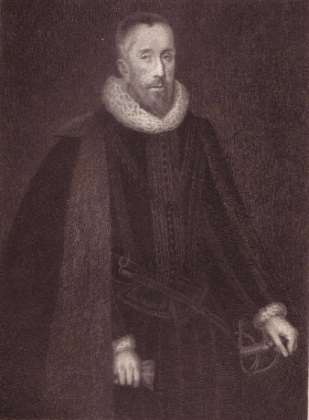 Earl
of Dunfermline, was the fourth son of George, the seventh Lord
Seton, and was the godchild of
Queen Mary.
From his godmother he received, as ‘ane Godbairne gift,’ the lands
of Pluscarden, in Moray. ‘Finding him of a great spirit,’ his
father sent him to Rome at an early age, and he studied for some
time in the Jesuits’ College, with the view of entering the
priesthood. It seems probable that he did take holy orders, and it
was thought that if he had remained at Rome he would have been
made a cardinal. The overthrow of the Roman Catholic Church in
Scotland probably induced young Seton, to abandon his ecclesiastical pursuits, and to betake
himself to the study of the civil and the canon law; and he passed
as an advocate before James VI and the Senators of the College of
Justice in the Chapel Royal at Holyrood in 1577. The most illustrious of these legal luminaries,
he was created an
Extraordinary Lord of Session in 1586, obtaining in the following
year a gift of the revenues of Urquhart and of the Priory of
Pluscarden. Two years later Alexander Seton became an
Ordinary Lord of Session under the title of Lord Urquhart, and in
1593 he was elected by his brethren to the president’s chair at
the comparatively early age of thirty-eight. He was appointed one
of the Octavians—a committee of eight persons to whom the King, in
1596, entrusted the management of public affairs, and who
introduced a number of important administrative reforms. On the
accession of James to the English throne, Lord Fyvie was entrusted
with the guardianship of Prince Charles, the King’s younger son.
In the following year he was summoned to London, along with the
Earl of Montrose, to take part in the negotiations for a union of
the two kingdoms, but though the King himself eagerly pressed the
measure, and was zealously supported .by Lord Bacon, it was found
to be premature, and had to be postponed for a century. While in
England Montrose was persuaded to resign the office of Chancellor,
which was conferred upon Seton. In 1605 Lord Fyvie was advanced to
the dignity of Earl of Dunfermline. His long enjoyment of the
royal favour and the good fortune which it had brought him had no
doubt excited the envy and jealousy of some of the courtiers.
Earl
of Dunfermline, was the fourth son of George, the seventh Lord
Seton, and was the godchild of
Queen Mary.
From his godmother he received, as ‘ane Godbairne gift,’ the lands
of Pluscarden, in Moray. ‘Finding him of a great spirit,’ his
father sent him to Rome at an early age, and he studied for some
time in the Jesuits’ College, with the view of entering the
priesthood. It seems probable that he did take holy orders, and it
was thought that if he had remained at Rome he would have been
made a cardinal. The overthrow of the Roman Catholic Church in
Scotland probably induced young Seton, to abandon his ecclesiastical pursuits, and to betake
himself to the study of the civil and the canon law; and he passed
as an advocate before James VI and the Senators of the College of
Justice in the Chapel Royal at Holyrood in 1577. The most illustrious of these legal luminaries,
he was created an
Extraordinary Lord of Session in 1586, obtaining in the following
year a gift of the revenues of Urquhart and of the Priory of
Pluscarden. Two years later Alexander Seton became an
Ordinary Lord of Session under the title of Lord Urquhart, and in
1593 he was elected by his brethren to the president’s chair at
the comparatively early age of thirty-eight. He was appointed one
of the Octavians—a committee of eight persons to whom the King, in
1596, entrusted the management of public affairs, and who
introduced a number of important administrative reforms. On the
accession of James to the English throne, Lord Fyvie was entrusted
with the guardianship of Prince Charles, the King’s younger son.
In the following year he was summoned to London, along with the
Earl of Montrose, to take part in the negotiations for a union of
the two kingdoms, but though the King himself eagerly pressed the
measure, and was zealously supported .by Lord Bacon, it was found
to be premature, and had to be postponed for a century. While in
England Montrose was persuaded to resign the office of Chancellor,
which was conferred upon Seton. In 1605 Lord Fyvie was advanced to
the dignity of Earl of Dunfermline. His long enjoyment of the
royal favour and the good fortune which it had brought him had no
doubt excited the envy and jealousy of some of the courtiers.